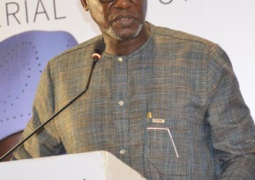In an effort to put long-term goals of the Paris Agreement into practice, countries are invited to formulate and communicate “long-term, low greenhouse gas emission development strategies” (LT-LEDS), also referred to as Long Term Strategies (LTS). These are visionary plans for achieving low-carbon, and climate-resilient societies by 2050.
Honourable Lamin B. Dibba, Minister of Environment, Climate Change and Natural Resourcessaid the impact of climate change on vulnerable communities and countries is immense, adding that it is therefore important to launch the Long-Term Climate Change Strategy (LTS).
He highlighted the importance of sector-wide approach to environment and climate change issues, saying the 2050 zero net carbon emission cannot be achieved without the collaboration of relevant sectors.
Minister Dibba stated that Long-Term Strategies play a key role in the transition towards net zero emission and climate resilient economies. He further said that climate change is all about lives and livelihoods and if not taken care of, it would induce disasters that disrupt livelihoods.
“The social and economic impacts of climate change is so huge that we need urgent and immediate action from all levels,” he pointed out.
Momodou Mbye Jabang, permanent secretary at the Ministry of Environment, Climate Change and Natural Resourcessaid without a careful long term strategy climate change, itmay undermine our development efforts with adverse consequences across the board on people’s livelihoods, the environment they live and work, as well as their personal health and welfare.
PS Jabang added that we have the moral duty to our children to create a world with a safe, clean and productive environment.
He described climate change as a global challenge which can only be successfully overcome through a global collaborative and cooperative effort, noting thatThe Gambia is prepared to play its role as a responsible member of the international community and make its own contributions.
Alpha A.K. Jallow, Director Climate Change Secretariat, Ministry of Environment, Climate Change and Natural Resourcessaid Climate Change has been and will continue impacting our country, affecting all productive sectors of the economy, impacting the country’s effort at continued national development and poverty reduction.
He added that to address the challenges, the Ministry of Environment has been working with stakeholders to formulate cross-sectorial strategic policies.
Alagie Fadera, Director, Development Planning at the Ministry of Finance and Economic Affairs said the development of the Long Term Climate Strategy (LTS) will be a continuation of the successful collaboration that began with the development of the 2050 climate vision.He added that the strategy would help in the full integration of climate into the country's policies and strategies, better supporting the needs, priorities, and adaptive capacities of communities most affected by climate change.
Siddharth Pathak, Director of Partnerships of the 2050 Pathways Platform addressed the gathering via satellite. He extolled the excellent working relationship that exists between the 2050 Pathways Platform and was optimistic that the Ministry of Environment would continue the good work started so far in the development of the LTS.
The session was organised by the Climate Change Secretariat and moderated by Ebrima Jawara, LTS National Coordinator and Bubacar Jallow, Nationally Determined Contribution Focal Point.
The LTS is envisaged to be completed by the end of August 2022.





